
~ Reflection ~ by Deborah Beach Giordano
Saying Grace
Many of us learned some kind of “table grace” as we were growing up. It may have been offered before every meal, at dinner time when the whole family was assembled together, or only on holidays when the grandparents were present. In the later case — as it was when I was growing up — the thanksgiving prayer might be decidedly “short and sweet.” My dad, who was a believer, but not particularly devout, would say,
“Bless, O Lord, these gifts to our use and us to Thy service. Amen.”
While a step above, “Good bread, good meat; good God, let’s eat!” it wasn’t exactly the sort of prayer that rang through the rafters and made the angels smile (or Gramma either, for that matter). But it did serve to remind us that what we were about to enjoy was a gift: that food was precious; literally life-giving and not to be taken for granted. Without it, we would perish.
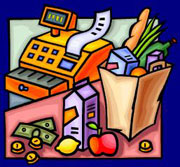 That’s an odd notion, for most of us, well-nourished as we are. The fact that “our daily bread” keeps us alive is something we rarely consider. We don’t have to worry about where our next meal is coming from, and — thanks to grocery stores and modern delivery systems — we usually have no idea where it came from. Like light bulbs, lawn mowers, or dishwashing liquid, food has become just another product that we purchase.
That’s an odd notion, for most of us, well-nourished as we are. The fact that “our daily bread” keeps us alive is something we rarely consider. We don’t have to worry about where our next meal is coming from, and — thanks to grocery stores and modern delivery systems — we usually have no idea where it came from. Like light bulbs, lawn mowers, or dishwashing liquid, food has become just another product that we purchase.
We’ve forgotten that it is a sacrament.
Not Just at Church
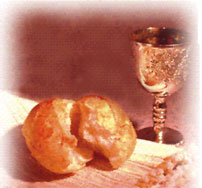 A sacrament is something sacred: a holy, blessed thing that connects us with the divine. Holy things are not restricted to the inside of a church, nor do they only take shape under the invocation of a priest.
A sacrament is something sacred: a holy, blessed thing that connects us with the divine. Holy things are not restricted to the inside of a church, nor do they only take shape under the invocation of a priest.
As that modern psalmist, William Blake, wrote, “All that lives is holy.” The living things that keep us alive are holy, sacred gifts. Like the manna given to the ancient Israelites, these have been sent to us from heaven:
- The plants miraculously formed from seeds, nurtured in the earth, watered by rains, irrigated from rivers, and warmed by Mother Sunshine;
- the cereals and breads made from these plants;
- the fruits, vegetables, nuts and berries that we eat;
- the juices we drink; the tea and coffee and cocoa that we enjoy;
- the cows and goats that provide milk used to produce cheese and yogurt and milk (and ice cream!);
- the hens who lay eggs;
- the fish, fowl, and mammals whose lives are sacrificed for our tables.
Our lives are sustained by the sacraments and sacrifices of many other lives. Our every meal is a miracle.
You Should Have Seen it Before
Which brings me to a story.
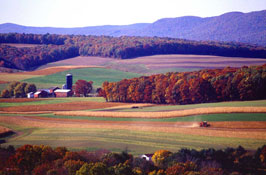 One afternoon the new pastor made a call to one of her rural parishioners. As the farmer showed the reverend around his property, she was overwhelmed by its beauty and abundance. Seeing the groves of apple trees, she said, “Isn’t it wonderful what God can do!” Walking past the rows of corn, she said, “Isn’t it amazing what God can do!” Looking out over the sea of golden wheat, she said, “Isn’t it wonderful what God can do!” Wherever they walked, the pastor enthused, “Isn’t it wonderful what God can do!” Finally the farmer rubbed his chin thoughtfully and said, “Yep. He’s a wonder. But you should have seen this place when He was working it by Himself.”
One afternoon the new pastor made a call to one of her rural parishioners. As the farmer showed the reverend around his property, she was overwhelmed by its beauty and abundance. Seeing the groves of apple trees, she said, “Isn’t it wonderful what God can do!” Walking past the rows of corn, she said, “Isn’t it amazing what God can do!” Looking out over the sea of golden wheat, she said, “Isn’t it wonderful what God can do!” Wherever they walked, the pastor enthused, “Isn’t it wonderful what God can do!” Finally the farmer rubbed his chin thoughtfully and said, “Yep. He’s a wonder. But you should have seen this place when He was working it by Himself.”
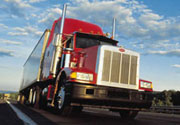 Wheat is not planted by divine action, nor is it harvested, milled, stored, or transported on its own. Many hands and many lives are involved in bringing us our daily bread. Our every meal is a miracle.
Wheat is not planted by divine action, nor is it harvested, milled, stored, or transported on its own. Many hands and many lives are involved in bringing us our daily bread. Our every meal is a miracle.
From the clearing of the land to the baking of the bread, others have contributed their share in sustaining our lives. No matter how isolated or independent we may sometimes believe ourselves to be, our lives are interwoven with one another. Our survival is a miracle of successful connections.
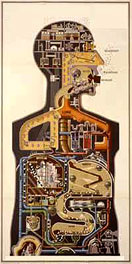
Outside and Inside
In addition to the miracle of the food that reaches our table, there is the miracle of its incorporation into our bodies. In an awe-inspiring coordination of muscles, chemical compounds, and organic materials, our bodies turn the food we eat into flesh and blood. What is needed is put to work in restoring tissue, building up our body, and fighting disease; what is unsuitable or no longer necessary is disposed of.
Our every meal is a miracle: a life-sustaining sacrament.
The Pause that Refreshes
If we took the time to fully consider the miracle that is set before us at every meal, we’d never get to the business of eating. But if we pause, even for a moment, and give thanks with truly grateful, aware hearts — how much richer our meals will be!
Virtual hugs and real-time blessings,
Deborah +
A Spiritual Exercise
Reflect on the miracle of “the manna from heaven” that appears on your plate at every meal.